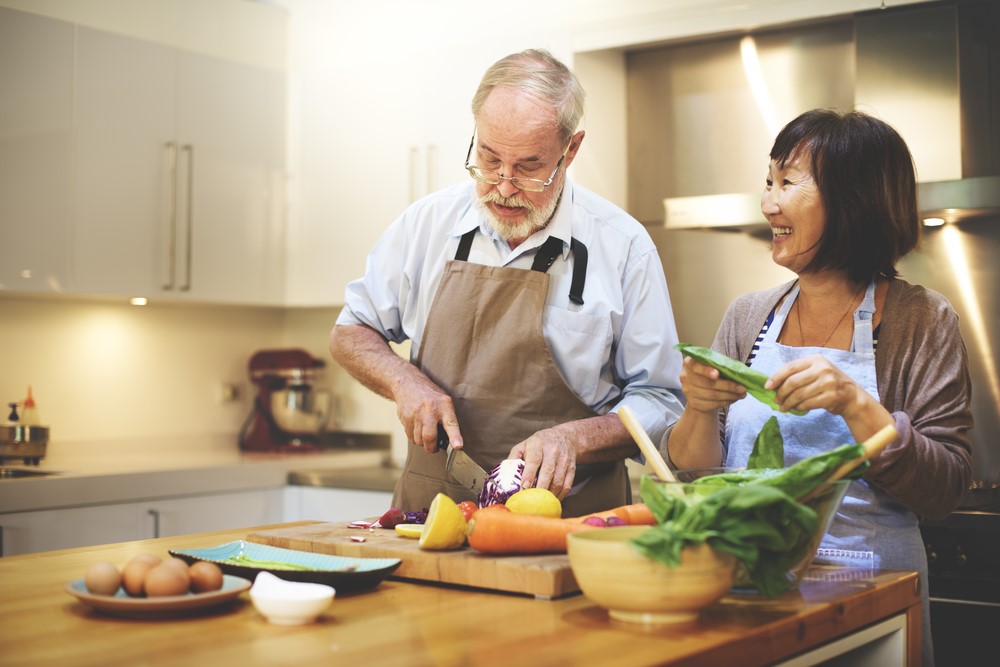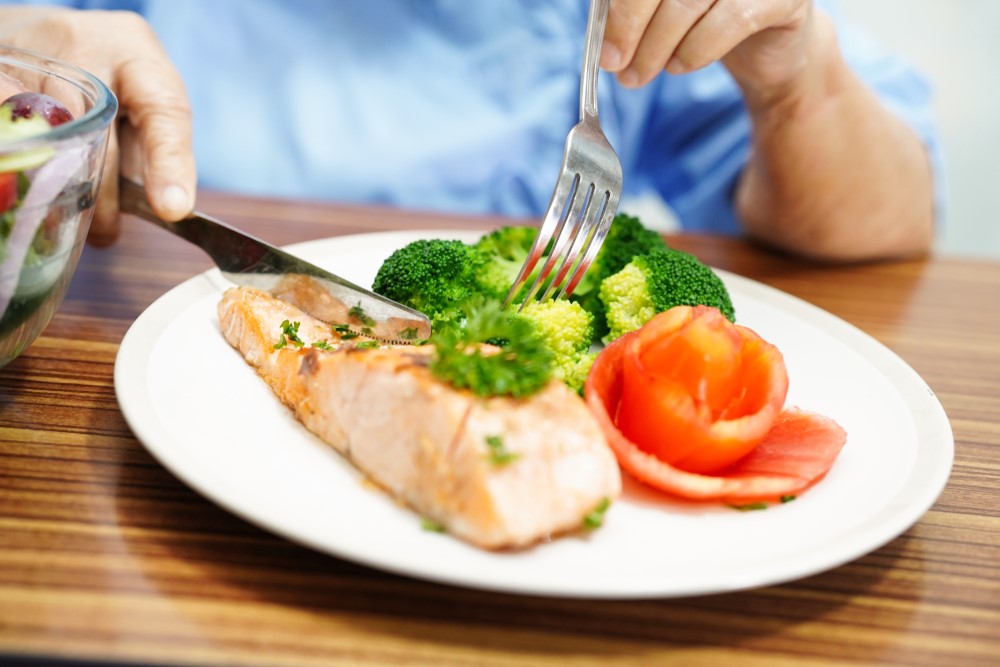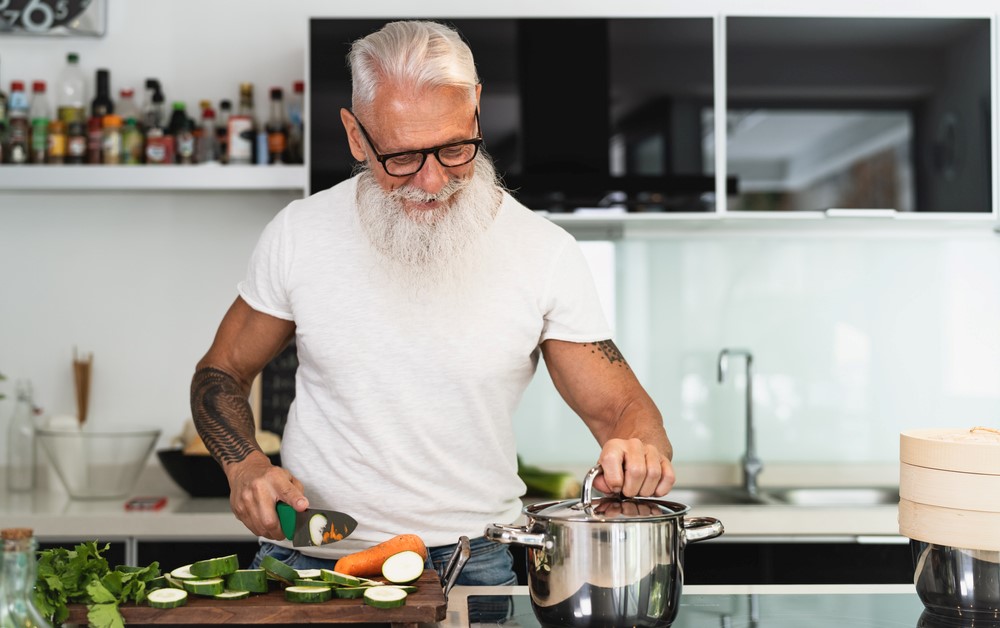
Getting enough nutrients is important at all stages of life, as nutrients provide your body with the building blocks that it needs to function well. Getting inadequate nutrients or calories can lead to a host of problems. Proper nutrition in the elderly is a particularly important topic, one that affects them and also their family members.
Malnutrition is the condition where the lack of nutrients or caloric intake disrupts metabolic function which can lead to disease.
Malnutrition comes in two forms, undernutrition and overnutrition. Undernutrition is either not enough protein, vitamins, minerals, or calories to maintain weight, while overnutrition is having too high levels of protein, vitamins, minerals, or calories.
To stay healthy, it’s important to avoid both forms of malnutrition.
Why Talk About Proper Nutrition in the Elderly?
While nutrients are important for everyone, the topic is particularly relevant for seniors, as they are more at risk of undernutrition due to their decreased metabolism which can lead to various health problems.
Getting enough nutrients also helps prevent loss of muscle mass and strength with age. Finally, good nutrition helps to protect the elderly against many diseases which may cause weight loss and other health problems.
When you get older your body becomes less efficient at digesting food and processing nutrients. This results in poor absorption of various nutrients.
The elderly not only have a harder time digesting food, but poor appetite and chewing problems can be a factor too. This is why the elderly need to get proper nutrition.
The Benefits of Good Nutrition for Seniors
Nutrition can help the elderly in various ways such as improving their health, reducing risk for disease, and preventing excessive loss of strength
Elderly people have a higher risk of being malnourished because they not only have a harder time digesting food but because food is also harder to chew. Poor appetite and swallowing problems are other factors.
It’s also important for them to understand any medical recommendations about their diet, along with whether their medications should be taken with or without food.
When you get older you require fewer calories for your age, but the nutrients in food still remain important for preventing disease and maintaining health with age.
That’s not all. Undernourishment can also lead to a loss of weight and strength, both of which can easily cause problems for seniors (like increasing their risk of falls).
Muscle Mass and Strength
People over the age of 50 are more likely to lose muscle mass and strength. This partly happens due to age-related muscle loss, but can also be the result of inactivity, unintentional weight loss, or health conditions.
Having proper nutrition helps to reduce the risk of unintentional weight loss and also helps to maintain muscle mass (especially when combined with resistance exercise).
Getting sufficient protein is an important part of this process, as protein is critical in muscle growth and maintenance.
Do Seniors Need More Nutrients?

It’s easy to assume that seniors need fewer nutrients than younger people. However, this isn’t the case at all. Instead, seniors still need a decent amount of important nutrients, including protein, calcium, iron, folate, and vitamin B12.
However, seniors do experience decreased appetite.
They may also need fewer calories per day, as they aren’t as active as when they were young.
Because of this, elderly people need to find ways to keep their nutrient intake high, even when they’re eating less food.
Senior Nutritional Needs
So then, which nutrients do seniors need and how do these affect their health?
Protein
To maintain muscle mass and physical fitness it is important to consume enough protein. The elderly need 1.0-1.2 grams of protein per kilogram of body weight daily.
Roughly 6 to 10 grams of protein should be consumed for breakfast or within 30 min after waking up because this will help prevent loss of muscle mass.
Protein is especially important in the elderly for maintaining a healthy weight, appetite and to help prevent diseases such as cancer, heart disease and diabetes. Additionally, it helps prevent wasting syndrome which is the rapid weight loss due to lack of muscle mass.
Vitamin D
Vitamin D is known as the sunshine vitamin because exposure to sunlight helps the body produce it. This vitamin can also be found in foods such as salmon, tuna, eggs, and mushrooms.
Vitamin D deficiency is common in elderly people because they don’t get out much which means they are not exposed to enough sunlight (which is where we get vitamin D) and they don’t eat much fish.
Plus, the skin naturally thins with age, making vitamin D synthesis less efficient.
Vitamin D is important for the elderly because it helps prevent osteoporosis which weakens bones. Also, muscle weakness can be prevented by having adequate Vitamin D intake.
Because vitamin D isn’t prevalent in food, many seniors are prescribed vitamin D supplements to help keep their levels up.
Iron
Iron deficiency is a common issue, especially among women and seniors. Iron is essential for energy production and preventing anemia. Without enough iron muscles will not function properly, fatigue will follow along with difficulty concentrating and even depression can set in.
Calcium
Calcium deficiency in the elderly is common because many of them avoid dairy products. This can lead to osteoporosis, especially in women and a loss of muscle strength which will only worsen the problem. The bones will become weaker and brittle which can cause fractures and pain.
Other Thoughts on Nutrition
Mineral supplementation can be used as an alternative if your elderly loved one does not get enough calcium in their diet.
However, it’s important to talk to the senior’s doctor before relying on supplements. Also make sure that you use a reliable brand.
Getting nutrition right really is important, as proper nutrition for elderly can help reduce the risk for disease, prevent weight loss and maintain a healthy body. There are many ways to get protein, vitamin D and minerals in your elderly loved ones’ diet such as: taking them shopping for groceries, preparing meals together or helping them shop online.
Burwood Nursing Home works hard to make sure all their residents have a nutritionally balanced diet, working with clinical and dietary experts.
What Foods Should Seniors Avoid?
Seniors should avoid foods high in saturated fat, trans fats, and cholesterol. Foods with processed sugars are best to be avoided too.
Sodium is another area to watch out for. Seniors following a heart healthy diet may need to significantly decrease their sodium intake.
These patterns mean that it’s best to avoid processed food whenever possible. Meals made from whole food ingredients tend to offer more nutrition than processed alternatives, while also being lower in salt, sugar, and saturated fat.
Elderly people need to be careful about medication interactions too.
For example, compounds in grapefruit and grapefruit juice interact with many medications and can lead to dangerous effects. Similarly, the vitamin K found in dark leafy greens like spinach may be an issue for anyone who relies on blood thinning medication.
What Causes Poor Nutrition in Elderly People?

Despite the importance of good nutrition, many seniors aren’t getting the nutrients that they need at all.
There are multiple reasons for this issue, starting with the fact that seniors have slower metabolisms which cause a decrease in the ability to digest food. This makes eating good food even more important.
Other factors can cause poor nutrition in the elderly such as poor appetite, chewing problems, and digestion problems.
Then there are prep-related issues, like seniors forgetting how to make basic dishes or having trouble with food preparation – including cutting difficult fruits and veggies, opening cans, and packages.
They may also have more difficulty in traveling to the grocery store or in getting the groceries back home.
While ordering groceries from home is often an option, seniors may not know how to do so effectively. Others may not have the finances for all the food they need or may make poor decisions (buying low nutrient comfort food, rather than nutritious foods).
Other factors could come into play too, like depression influencing a senior’s desire to prepare food for themselves.
All of these issues mean that you might need to step in and ensure that your elderly loved ones are eating well.
Loss of Appetite
Decreased appetite commonly occurs with age and can lead to poor nutrition as well. After all, people tend to eat based on hunger, so when their appetite decreases, they’re likely to consume less food.
Loss of appetite can be caused by many reasons such as, poor dental health, chewing and swallowing problems, poor smell or taste, uncontrolled pain, social isolation, depression, and anxiety. If your elderly loved one is experiencing a loss of appetite it is important to encourage healthy food choices that may appeal to them.
Loss of appetite can increase the risk for malnutrition because of the lack of nutrients and calories consumed, which can eventually lead to unhealthy weight loss.
How to Help Seniors Get More Nutrients
Thankfully, you don’t need to leave things up to chance. There are plenty of ways to help make sure that your loved one is eating well.
Encourage them to Focus on Whole Foods
Meals made from whole foods, including vegetables, legumes, and whole grains, will always be healthier than processed ones.
Turn to Small and Flavorful Meals
Decreased appetite and taste are two major issues for elderly people. You can make the first easier by focusing on small meals and many snacks, rather than three meals a day.
This way the senior doesn’t have a large amount of food to eat at any time.
Making the food look and taste interesting can help as well. Spices are an important tool here, giving food plenty of extra flavor without increasing the sodium content.
Focus on Nutrient Dense Foods
Nutrient density is an important area when talking about senior nutrition and health.
The term refers to how many vitamins and minerals there are in a type of food, compared to its calorie content. Foods with high nutrient density, like spinach, tend to have many important nutrients, without that many calories.
High nutrient density foods are highly relevant for the elderly, as they offer a way to keep nutrient intake high, even if appetite decreases.
Many nutrient dense foods are plant-based, such as fruits and vegetables, legumes, and whole grains. As such, the foods are also important sources of antioxidants and other plant-based compounds.
Look Closely at the Problems
What is it that is causing the senior problems? If you can identify the cause of nutritional issues, you can start looking for solutions.
And, honestly, most problems have solutions.
For example, if the senior is struggling in the kitchen, consider making the environment and tools more senior-friendly. This could include reducing fire hazards and making sure there are plenty of easy grip tools for them to use.
If they find grocery shopping difficult, perhaps you could pick up groceries for them or teach them to shop online.
Meal kit services like Hello Fresh can be useful too, as these ship fresh ingredients that are partly prepped, making life much easier.
If the senior can’t cook for themselves, you might consider food delivery services, including Meals on Wheels. Cooking for them is another option or perhaps even hiring someone to deliver cooked meals to them regularly.
This post includes sponsored links.

Leave a Reply